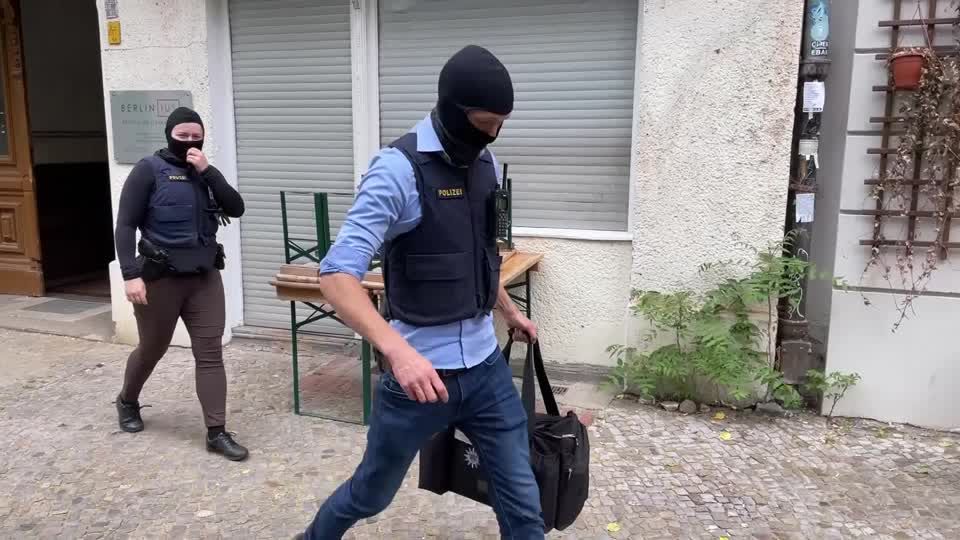Some consider the last generation to be a criminal organization, others consider the police actions to be exaggerated. Politicians and lawyers assess the group and its activities very differently.
After the raids on members of the climate protection group Last Generation, cross-party doubts were raised as to whether this should be classified as a criminal organization. Several politicians made it clear on Thursday that while they reject the group’s methods, they are also critical of the authorities’ actions. After their website was confiscated, the last generation launched a new website and called for further protests.
On behalf of the Bavarian prosecutor, investigators searched a total of 15 properties in seven federal states on Wednesday. Last generation accounts have also been banned. This was followed by spontaneous demonstrations in several cities, including Berlin. Federal Interior Minister Nancy Faeser (SPD) supported the intervention of the authorities.
Politicians assess last generation
“The last generation is not a criminal organization,” former Berlin Senator for the Interior, Ehrhart Körting (SPD), told the Tagesspiegel. He criticized the actions of the authorities as “wrong”. The left-wing politician Gregor Gysi warned that the raids would only promote further escalation.
The Greens legal expert Helge Limburg expressed legal doubts about the “general assumption of a criminal organization” in the editorial network Germany. On the other hand, the SPD legal expert Sebastian Hartmann told the RND newspapers that the raids were important for the investigation of the last generation. However, he emphasized that the accusation of the criminal organization has so far been about “an initial suspicion”.
CDU leader Friedrich Merz called for tough action against the last generation. “These are criminals and not interlocutors,” he told the broadcasters RTL and ntv. The question of whether it is a criminal organization must now be clarified by further investigations.
The deputy FDP chairman Johannes Vogel told ARD that with their controversial actions the last generation was doing “a disservice to the issue of climate protection”.
Lawyers argue about “criminal organization”
It is disputed among lawyers whether the last generation can be classified as a criminal organization under Section 129 of the Criminal Code. There is no judicial determination on this yet. However, various public prosecutors are investigating in this direction. Others see no initial suspicion so far. Criminal law professor Thomas Fischer even comes to the conclusion that committing “crimes that are as spectacular as possible” actually shapes the organization’s appearance. The group’s decision-making structure and logistics are geared towards criminal actions.
It should also be borne in mind that there are also more serious crimes than sticking on streets or works of art or attacks on paint bags, such as attempts to sabotage an oil pipeline from Italy to Bavaria and on the site of the Schwedt refinery. Against this background, the accusation that the group is a criminal organization might be easier to justify.
Glued, sprayed, walked
With God’s blessing and scientific solidarity: The last generation won’t let Berlin rest
According to the law, “the purpose or activity” of a criminal organization must be directed towards the commission of crimes. The provision cannot be applied “if the commission of criminal offenses is only a purpose or an activity of minor importance”.
Problematic classification of the Bavarian police
It is considered legally problematic that the blocked Internet address of the last generation was forwarded to a website of the Bavarian police on Wednesday, on which their classification as a “criminal organization” was presented as a fact. The authorities later took this back.
Left-wing politician Lorenz Gösta Beutin told Bayerischer Rundfunk: “The public prosecutor’s office has placed itself above our jurisdiction and our courts.” The Greens politician Limburg made a similar statement: “The prepared, obviously illegal statement by the State Criminal Police Office on the website of the last generation, with which the presumption of innocence was trampled on, puts the whole action in a dubious light,” he told RND.
Green parliamentary group leader Konstantin von Notz also called for legal clarification of allegations on Twitter that the CSU could have had “illegitimate political influence” on the investigating authorities in connection with the Bavarian state election campaign.
“We condemn this intimidation of people who work to comply with global climate agreements,” said the climate protection movement Fridays for Future. The network Campact spoke of a criminalization of “legitimate climate activism”. The general manager of the Paritätischer Gesamtverband, Ulrich Schneider, wrote on Twitter that the actions of the authorities reminded him of “autocratic regimes”.
New domain of the last generation
The climate protection group meanwhile released the new website, the latest generation.org. There she asked for donations again, this time via another organization. In addition, the last generation called on Twitter for further rallies in several cities under the motto “Climate protection is not a crime”. Spokeswoman Carla Hinrichs spoke of a “wave of support” after the raids. The last generation is “since yesterday stronger than ever”. Greenpeace, BUND and other environmental organizations had also condemned the actions of the authorities.

The fact that climate activists commit criminal offenses has been established in court in many cases. The blockade of car traffic has now been classified as coercion by several courts, and imprisonment without probation has also been imposed. Other courts did not see it that way. The activists point out that their ultimate goal is to raise public awareness of the climate crisis. Accordingly, the sit-ins could be seen as spontaneous political rallies that fall under the constitutionally protected freedom of assembly. Nevertheless, activists of the last generation consciously accept that their actions can be classified as punishable – for example as coercion, property damage or dangerous interference with traffic.
Source: Stern
I have been working in the news industry for over 6 years, first as a reporter and now as an editor. I have covered politics extensively, and my work has appeared in major newspapers and online news outlets around the world. In addition to my writing, I also contribute regularly to 24 Hours World.




